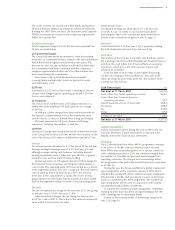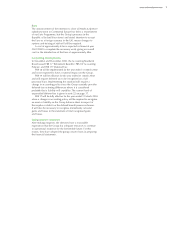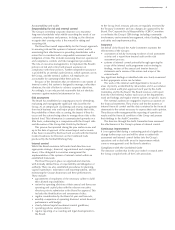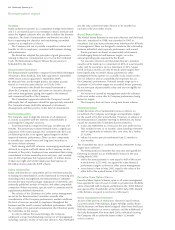Marks and Spencer 2001 Annual Report Download - page 10
Download and view the complete annual report
Please find page 10 of the 2001 Marks and Spencer annual report below. You can navigate through the pages in the report by either clicking on the pages listed below, or by using the keyword search tool below to find specific information within the annual report.
10 Marks and Spencer p.l.c.
Strategy
Marks & Spencer operates in a competitive trading environment
and it is an essential part of our strategy to attract, motivate and
retain the highest achievers who are able to deliver the business
objectives. The level of remuneration and benefits we offer is
key to supporting this objective and maintaining our market
position as an employer of choice.
The Company sets out to provide competitive salaries and
benefits for all its employees, consistent with business strategy
and performance.
The Board has adopted the principles of good governance
relating to directors’ remuneration as set out in the Combined
Code. The Remuneration Report follows the provisions in
Schedule B to the Code.
Remuneration Committee
The Remuneration Committee comprises Dame Stella Rimington
(Chairman), Brian Baldock, Tony Ball (appointed 1 September
2000), Kevin Lomax (appointed 1 September 2000),
Sir Michael Perry and Sir Ralph Robins. Sir Martin Jacomb
retired as a non-executive director on 19 July 2000.
It recommends to the Board the reward framework to
allow the Company to attract and retain its executive directors
and senior management, giving due regard to the financial
and commercial health of the Company.
The Committee’s approach reflects the Company’s overall
philosophy that all employees should be appropriately rewarded.
The Committee keeps itself fully informed of all relevant
developments and best practice in the field of remuneration.
Remuneration policy
The Company aims to align the interests of all employees
as closely as possible with the interests of shareholders in
promoting the Company’s recovery.
Total remuneration comprises fixed pay, variable pay and
benefits. The performance-related element forms a significant
proportion of the total package and, consistent with the focus
on delivering results, is set against agreed targets to deliver
improved business performance. There are two components
to variable pay: annual bonus and long-term incentives in
the form of share schemes.
Profit sharing and SAYE schemes, encouraging employees at
all levels to acquire and hold shares in the Company, are key
elements of the policy. Employees have maintained their strong
commitment to share ownership in recent years, and currently
over 43,000 employees hold approximately 33 million shares
in their own right and 32,000 employees hold options on
80 million shares under the SAYE scheme.
Salary and benefits
Salary and benefits are competitive and are reviewed annually.
In making recommendations on the framework for retaining and
rewarding senior management, the Remuneration Committee
reviews the total reward package, making use of internally and
externally published surveys of retailers and other comparable
companies. Where necessary, specific work is commissioned to
supplement published information.
The salaries of the Chairman and other senior management
are set by the Remuneration Committee annually after
consideration of the Company performance, market conditions,
the level of increase awarded to employees throughout the
business and the need to reward individual performance. With
the exception of his personal remuneration, the Chairman assists
the Committee in this review.
In order to deliver the reward strategy, the Company
underwent a major benchmarking exercise for all management,
including a specific review of executive directors. Alan McWalter
was the only current executive director to be awarded an
increase in the year under review.
Annual Bonus Scheme
The Annual Bonus Scheme for executive directors and divisional
directors, introduced in 1988, was extended in 1995 to
executives. Last year, bonus schemes were introduced for all levels
of management. These are designed to reinforce the relationship
between individual and corporate performance and reward.
Bonus payments are based on measurable achievement
of challenging financial and business targets, set in the
annual operating plan approved by the Board.
For executive directors and divisional directors, potential
awards can be made up to a maximum of 60% of a participant’s
salary and for executives, up to a maximum of 40%. Upper
levels of bonus awards can only be made where targets have
been significantly exceeded. Bonus payments for other
management levels operate on a variable scale, based on the
level of influence and accountability the employee has on
the Company’s performance. Potential awards range up to a
maximum of 20% when targets are exceeded. Bonus payments
do not form part of pensionable salary and are not eligible for
profit sharing.
No bonus was earned by management under the schemes
in the year under review due to Company performance being
below set targets.
The Company does not have a long-term bonus scheme.
Chairman’s bonus
Under the terms of Luc Vandevelde’s service contract, on
recruitment, the Company set strategic and qualitative targets
for the award of his first annual bonus. However, in advance of
the Remuneration Committee meeting to determine any bonus
award, he informed the Committee that he wished to:
• waive any entitlement to a bonus for the year under review.
This included 100% of 13 months’ salary totalling £704,000
and an opportunity to enhance this, over time, by a further
£112,000;
• reduce his notice period entitlement from 12 months to
nine months.
The Committee has since confirmed that the 2000/2001 bonus
targets were achieved.
The Remuneration Committee has now met and agreed the
following in relation to Luc Vandevelde’s bonus for the year
ending March 2002:
• add to his bonus potential a sum equal to half of this year’s
waived bonus (£352,000), set against the same financial
performance targets as those for other senior management;
• issue shares to him in May 2002, equal to the value of the
other half of the waived bonus (£352,000).
Executive Share Option Scheme
Executive Share Option Schemes, open to all senior management,
have operated for over 20 years. In order to provide more flexibility
and a closer link with Company performance, the ‘2000 Scheme’
was approved by shareholders at the AGM in July 2000. Details
of the Scheme are given in section 6 of this report.
Senior management restructure
As part of the process of restructure, directors Clara Freeman,
Guy McCracken, Peter Salsbury, Roger Aldridge and Joe Rowe
left the business and Barry Morris stepped down from the Board.
With the introduction of service contracts and the withdrawal of
the Early Retirement Plan from April 2000, individuals leaving
the Company did so under the terms of their 12 months’
service contract.
Remuneration report























